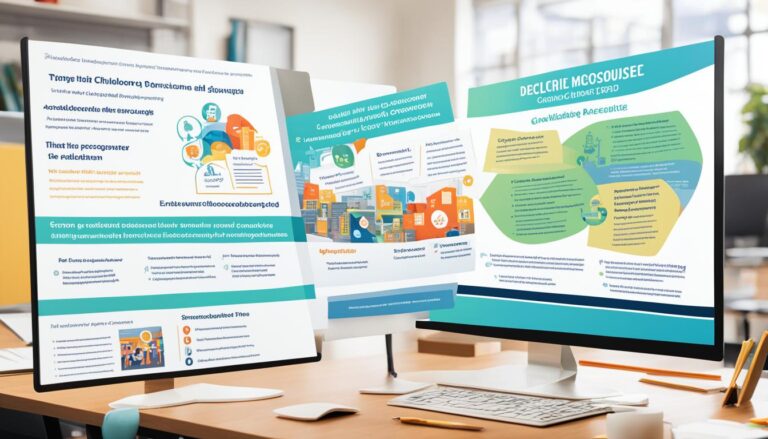Navigating Teen Dating: A Parent’s Guide
As a parent, navigating the world of teen dating can be both daunting and unfamiliar. It’s natural to feel concerned about your teenager’s well-being and want to provide them with guidance and support during this important stage of their life. Research has shown that fostering healthy relationships and open communication with your teenager is vital for their overall well-being and the development of healthy dating habits.
In this guide, I will share some valuable tips and strategies to help you navigate teen dating effectively. By understanding the dynamics of teen dating, setting boundaries and expectations, maintaining open communication, and teaching healthy dating habits, you can empower your teenager to build and maintain healthy relationships.
Key Takeaways:
- Navigating teen dating requires parental guidance and support.
- Healthy relationships and open communication are crucial for your teenager’s well-being.
- Understanding the phases of teen dating and the influence of peers is important.
- Setting clear boundaries and expectations helps promote safety and learning.
- Open communication and active listening foster trust and strengthen the parent-child relationship.
Understanding Teen Dating Dynamics
Teen dating is a journey that progresses through various phases, each presenting unique challenges and opportunities for growth. By understanding these phases and their impact on a teenager’s dating experience, parents can better support and guide their adolescents in developing healthy relationships.
The initial phase of teen dating often involves group activities, allowing teenagers to socialize and get to know their peers in a low-pressure setting. Group dates provide a comfortable environment for teenagers to interact and build connections with others, fostering the development of social skills and an understanding of personal boundaries.
As teenagers grow more comfortable with the concept of dating, they may start transitioning to one-on-one dating experiences. This phase signifies a deeper level of emotional connection and the exploration of romantic relationships. It is during this time that peer influence becomes more prominent, as teenagers look to their friends for guidance and validation in their dating choices.
Research has shown that peer influence can significantly impact a teenager’s dating behavior. They may adopt certain dating norms and behaviors to fit in with their peers, potentially leading to unhealthy or risky relationship choices. As a parent, it is crucial to be aware of these influences and have open discussions with your teenager about making safe and informed decisions.
The Importance of Emotional Development
It is essential to recognize that teenagers are still undergoing significant emotional development during their dating years. They are navigating a complex range of emotions, such as attraction, infatuation, and the experience of first love. Understanding and acknowledging this emotional journey can help parents approach discussions about dating with empathy and patience.
“During adolescence, teenagers are exploring and discovering their own emotions, as well as learning how to navigate and understand the emotions of others. Maintaining open lines of communication and providing guidance can help teens develop healthy emotional intelligence.”
By promoting emotional development and healthy coping mechanisms, parents can empower their teenagers to navigate the ups and downs of dating while fostering resilience and self-awareness.
Influence of Peer Pressure
Adolescence is a time when peer approval and acceptance become increasingly important. In the context of dating, peer pressure can greatly impact a teenager’s decision-making process and relationship choices.
Friends and peers play a significant role in shaping a teenager’s perception of what is acceptable behavior in relationships. They can influence dating preferences, expectations, and even the level of respect and communication within relationships. As a result, it is vital for parents to maintain open lines of communication and engage in conversations that help teenagers critically evaluate and navigate the influence of peer pressure on their dating experiences.
Acknowledging Individual Differences
While understanding the general dynamics of teen dating is crucial, it is essential to remember that each teenager is unique, and their dating experiences may vary. Some teenagers may progress through the phases of teen dating at different rates, and their emotional development may differ based on their individual circumstances.
As a parent, it is important to approach discussions about dating with sensitivity and allow your teenager to express their feelings and experiences. By acknowledging and respecting these individual differences, parents can provide the necessary support and guidance tailored to their teenager’s needs.
| Key Points: |
|---|
| – Teen dating progresses through phases, starting with group activities and transitioning to one-on-one dating. |
| – Peer influence plays a significant role in a teenager’s dating behaviors and choices. |
| – Recognizing the emotional development of teenagers helps parents approach discussions about dating with empathy and patience. |
| – Individual differences should be acknowledged and respected when guiding teenagers through the complexities of dating. |
Setting Boundaries and Expectations
When it comes to teen dating, establishing clear boundaries and expectations is crucial. As parents, we have the responsibility to set rules that help guide our teenagers in their dating experiences. These boundaries not only ensure their safety and well-being but also provide valuable lessons about healthy relationships.
Setting Rules
One way to set boundaries is by establishing specific rules regarding curfew and appropriate dating behavior. By defining a curfew, we can ensure that our teenagers are mindful of their responsibilities and prioritize their safety. It also helps us keep track of their whereabouts and ensure they are not exposed to risky situations.
“Setting boundaries is like creating a roadmap that your teenager can follow while exploring the world of dating.”
Additionally, it’s essential to discuss and agree upon appropriate dating behavior. Talk to your teenager about respecting personal boundaries, consent, and the importance of treating their partner with kindness and respect. By setting these rules, we provide a framework for our teenagers to understand what is acceptable and what is not in a relationship.
Communication Boundaries
Along with setting rules, it’s crucial to establish communication boundaries with our teenagers. Encourage open and honest communication, where they can approach us without fear of judgment or retribution. This creates an environment where they feel comfortable seeking guidance and sharing their experiences.
However, it’s also important to respect their privacy and give them space to navigate their dating lives. While staying involved and informed, we should avoid invading their privacy or constantly prying into their personal matters.
A Supportive Approach
As we set boundaries and expectations, it’s essential to approach these discussions with a supportive and understanding mindset. Remember that our teenagers are still learning and growing emotionally. We should be patient and empathetic, acknowledging their experiences and emotions, and offering guidance when needed.
By effectively setting boundaries and expectations, we create a safe and supportive environment for our teenagers to explore and learn about healthy relationships. Let’s provide them with the tools they need to navigate the complexities of teen dating while promoting their overall well-being.

Open Communication and Active Listening
Maintaining open communication with your teenager is vital for navigating teen dating successfully. Creating a safe space for your child to discuss their feelings and experiences without judgment is crucial. By adopting a non-judgmental approach, you allow your teenager to feel comfortable expressing themselves and seeking guidance when needed.
Active listening is an essential skill to develop when engaging in conversations about teen dating. It involves fully focusing on what your teenager is saying, without interrupting or jumping to conclusions. This type of listening encourages open dialogue and fosters trust between parents and their children.
“Active listening is the key to unlocking effective communication with your teenager. By truly hearing their words and understanding their perspectives, you create a foundation for a strong parent-child relationship.”
To practice active listening, ask open-ended questions that promote thoughtful responses and reflection. These questions provide an opportunity for your teenager to share their thoughts and feelings more deeply. Additionally, when your teenager opens up about their experiences, it’s important to offer guidance and support while respecting their autonomy and individuality.
Remember, the goal of open communication and active listening is not to control or dictate your teenager’s dating decisions but to empower them to make informed choices. It’s about creating a safe environment where they can openly discuss their concerns, seek advice, and learn from their experiences.
Promoting Healthy Communication
Teen dating can present various challenges, and effective communication is key to addressing and resolving them. Here are some strategies to encourage healthy communication:
- Set aside dedicated time to talk with your teenager regularly.
- Practice empathy and understanding to create a non-threatening atmosphere.
- Be an active listener by maintaining eye contact and providing verbal and non-verbal cues that show you’re engaged.
- Encourage your teenager to express themselves without fear of judgment.
- Respect their boundaries and privacy, ensuring they feel comfortable sharing without feeling violated.
These strategies promote open dialogue and strengthen your connection with your teenager, allowing you to be a trusted source of guidance and support.
The Importance of Active Listening
Active listening not only helps strengthen your relationship with your teenager but also enables you to identify their needs and concerns more effectively. By actively listening, you gain valuable insights into their experiences, emotions, and thought processes related to teen dating. This understanding allows you to provide targeted guidance and support tailored to their specific circumstances.
Engaging in open communication and actively listening to your teenager reinforces their confidence in approaching you with important matters. It fosters mutual respect and understanding, empowering them to make well-informed decisions about their relationships and navigate the complexities of teen dating more effectively.
Teaching Healthy Dating Habits
As a parent, I believe it is crucial to teach my teenager about healthy dating habits. This involves having open and honest discussions about important topics such as consent, respect for boundaries, and effective communication skills. By equipping teenagers with these essential skills, we can empower them to make informed choices and build healthy relationships.
Consent is a fundamental aspect of any healthy relationship. It is crucial to teach teenagers the importance of seeking and giving consent in all aspects of their dating life. Encourage them to understand that consent should be enthusiastic, ongoing, and based on clear communication between both parties.
Respect is another key pillar of healthy dating habits. I emphasize to my teenager the significance of respecting their partner’s boundaries, feelings, and opinions. By promoting respect, we help teenagers cultivate a culture of mutual understanding and consideration in their relationships.
Effective communication skills are vital for building and maintaining healthy relationships. I encourage my teenager to express their thoughts and feelings openly and honestly, while also actively listening and empathizing with their partner. Good communication forms the foundation for resolving conflicts, deepening connection, and ensuring that both individuals feel heard and valued.
Remember, healthy dating habits are essential for teenagers to develop meaningful and respectful relationships. By teaching them about consent, respect, and communication skills, we can guide them towards building positive connections that will positively impact their lives.

In the next section, let’s explore some practical strategies for parents to effectively communicate with their teenagers about teen dating, while promoting a safe and supportive environment.
Conclusion
Navigating teen dating can be a challenging task for parents, but it is crucial to provide guidance and support throughout this important stage of your child’s life. By establishing clear boundaries, maintaining open communication, and teaching healthy dating habits, parents can help their teenagers develop the skills necessary for building and sustaining healthy relationships.
Setting boundaries is vital to ensure the safety and well-being of your teenager. Rules regarding curfew, appropriate dating behavior, and communication boundaries can help create a supportive environment for your child. It is also essential to maintain open communication, allowing your teenager to express their feelings and experiences without judgment. Active listening and offering guidance when needed can strengthen the parent-child relationship and foster trust.
Parents should also take the opportunity to teach their teenagers about healthy dating habits. Discussing concepts such as consent, respect for boundaries, and effective communication skills will empower your teenager to make informed choices and enter into healthy relationships. By equipping them with these skills, you can help mitigate potential pitfalls and ensure they develop a strong foundation for future relationships.
Remember, navigating teen dating is a journey that requires parental guidance, a commitment to open communication, and an emphasis on teaching healthy dating habits. By providing the necessary support, parents can help their teenagers navigate the complexities of dating while promoting their overall well-being.
FAQ
What are some tips for parents to navigate teen dating?
Some tips for parents to navigate teen dating include fostering healthy relationships, establishing clear boundaries and expectations, maintaining open communication, and teaching healthy dating habits.
How does peer influence affect teen dating behavior?
Peer influence can have a significant impact on teen dating behavior. It is important for parents to recognize the influence of peers and understand how it can shape their teenager’s dating choices and decisions.
What boundaries should parents set when it comes to teen dating?
When it comes to teen dating, parents should set boundaries regarding curfew, appropriate dating behavior, and communication. These boundaries help ensure the safety and well-being of teenagers while allowing them to explore healthy relationships.
How can parents maintain open communication with their teenagers?
Parents can maintain open communication with their teenagers by creating a safe space for them to discuss their feelings and experiences without judgment. Active listening, asking open-ended questions, and providing guidance and support are key to fostering open dialogue and strengthening the parent-child relationship.
What are healthy dating habits that parents should teach their teenagers?
Parents should teach their teenagers about healthy dating habits, including discussions about consent, respect for boundaries, and the importance of effective communication skills. Equipping teenagers with these skills empowers them to make informed choices and engage in healthy relationships.






